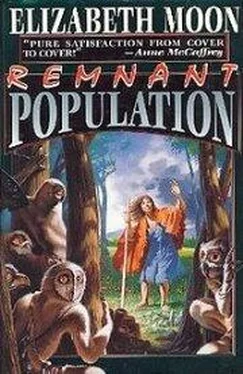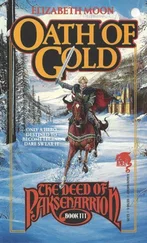“Listen to me,” Barto insisted. His hand came between Ofelia and the tomatoes, caught her chin and forced her face around. “You still have a vote in the council, mama. You have to come to the meeting. You have to vote with us. We have a chance to choose where we’re sent.” A meeting. She hated meetings. She noticed he didn’t tell Rosara, but then he knew Rosara would come anyway, and vote however he told her.
“A vote is a vote,” he told her now, louder, as if she were deaf. “Even yours.” He released her chin. “Go inside now; get ready” Ofelia edged past him, her bare toes safely distant from his hard-soled boots. “And wear shoes!” he yelled after her. Behind her, his voice and Rosara’s were lower without being softer, harsh mutterings she could not quite hear.
She had bathed, washed her hair, and put on the best clothes she had left. The dress hung loosely now, the waist dipping where she had nothing left above to fill the bodice, the hem lifting behind to accommodate the stoop in her back. On her feet, the shoes she had not worn for months cramped her toes and rubbed her heels. She would have blisters from this meeting, and what good would that do? She had leaned her head on the kitchen door and heard Barto tell Rosara that on another world his mother would surely be forced to dress decently again. He meant wear shoes, and a dark dress like this, all the time. She sat quietly on the bench beside Rosara, and listened to the sounds of grief and anger that filled the room. Only a few saw this as opportunity — a few men, a few women, about half the younglings. The rest saw only wasted years, loss, misery. They had worked so hard, and for what? How could they start over, face the same hard work again? Here at least they had houses already built, gardens already planted. Carl and Gervaise interrupted the complaints and presented the alternatives to vote on, though they never said how they’d learned about them. Ofelia did not believe the Company would give them a choice; she was sure the vote would come to nothing. Still, when Barto reached across Rosara to prod her ribs and hiss at her, she stood when he did, voting for Neubreit rather than Olcrano. The others voted for Neubreit, almost two thirds of them, and only the most stubborn, like Walter and Sara, insisted they would not go there.
Only at the end of the meeting, when she stood up and turned around, did she notice the Company rep, standing at the door. He had the sleek, youthful look of a shipman, someone whose skin never saw starlight but through a hatch. No sun had baked him; no winter had frozen him; no rains had washed, or winds dried, him. In his crisp, clean clothes, his polished shoes, he looked like an alien. He said nothing. Before anyone could speak to him, he had turned and walked away, into the darkness. Ofelia wondered if he knew about the slimetrails, but of course he would have shipeyes; he would be able to see where colonists could not.
The next morning, Ofelia rose at dawn and went out into the garden, barefooted as always and wearing her oldest workshirt. Until the sun rose, she refused to wear her hat, and so she saw the movement along the lane beyond the garden, the Company reps in their crisp shipclothes. Many of them. All wearing the same blue-gray uniforms the color of morning fog, with the Sims Bancorp logo. One of them stopped to stare back at her. “Ma’am,” he said, unsmiling but polite. The thing she loved most about dawn was the silence, the emptiness of it. He stood there, as if he had a right to ruin her morning solitude. He was going to ask questions, and in courtesy she must answer them. She sighed, and looked away, hoping he would think her too old and fuddled to be worth his time.
“Ma’am, did you vote last night?”
He wasn’t going away. She looked at him, seeing the youth, the differentness… the skin untouched by weather, the eyes that stared right at her as if he had the right… “Yes,” she said shortly. Then, because courtesy would not allow her to be so abrupt, she found herself saying, “I don’t know what to call you… I don’t mean to be rude.”
He smiled, genuinely amused. Was courtesy so rare among the shipfolk still? “I wasn’t offended,” he said.
He came nearer. “Are those real tomatoes?”
He had not answered her question. She would have to be more direct. “I cannot talk to someone when I have no way to address them,” she said. “My name is Sera Ofelia.”
“Oh — I’m Jorge. Sorry. You reminded me of my grandmother; she calls me Ajo. But — do they really grow like this, in the open… contaminated?”
Ofelia stroked the leaves with her hand, releasing the heavy scent. “Yes, these are tomatoes, and yes, they grow in the open air. They have no tomatoes now, of course; they are just blooming.” She turned up several leaves to show him the clusters of flower-buds.
“It’s too bad,” he said, in the tone of one who is politely regretting some inconvenience he will not himself endure. “You have such a garden, and it’s wasted—” “Nothing is wasted,” Ofelia said.
“But you’re leaving in thirty days,” the young man said. She reminded herself that his name was Jorge and he had a grandmother who loved him. That seemed impossible; he could have popped from a glisswrapped package like the holiday gifts of her childhood, brightly colored and smooth all over. Surely he had not been born in blood and mess like real children. “You don’t have to work in the garden any more. You should be packing.”
“I like working in the garden,” Ofelia said. She wanted him to go away. She wanted to find out what had just changed in her, somewhere inside, when he said “But you’re leaving.” She looked down. On the ground, on top of the mulch, a slimerod oozed along looking for something to puncture with its one hard part, its little hollow cylinder of shell. Ofelia picked it up by its soft hinder end and watched it lengthen until it was at least ten centimeters long and thin as yarn. Then she flicked it around with a practiced snap of the wrist, and cracked its shell on her other thumb. It made her thumb sting a moment, but it was worth the sting for the look of shocked horror on the young man’s face.
“What was that ?” he asked. From his expression, he expected to hear something terrible. Ofelia obliged. “We call it a slimerod,” she said. “And the piercing part is like a medical needle, hollow, so it can suck—” She didn’t have to say more; the young man was backing away already. “Can it go through… shoes?” He was staring now at her bare feet. Ofelia grinned to herself, and made a show of scratching the back of one leg with her other foot.
“It depends on the shoes,” she said. She supposed it might go through a pair of thin cloth shoes with holes in them already. And it didn’t go through human skin (she didn’t know why) but she didn’t say that. Mostly it went through the stems of her plants, not finding what it wanted and leaving wounds the plants spent precious calories mending. But if it made the young man sick enough to go away, she would imply horrors.
“I guess you’ll be glad to leave,” the young man said.
“Excuse me,” Ofelia said. “I have to use the…” she gestured at the shed at the end of the garden. That did it; he flushed an uncomely color and turned away abruptly. She almost giggled. He should have known they had inside conveniences; the first thing the colonists had done was install their waste recycler. But she was glad to see him go. In case he turned back, she walked the rest of the way to the toolshed and went in.
Ofelia had moved before. She knew that it took longer than thirty days to move, if you tried to take things with you. The Company reps had told people they need take nothing; it would all be provided. But forty years is forty years, a lifetime for some, more than that for others. Few of the originals were left; Ofelia was the oldest of these. She had the clearest memory of other places, and she sometimes woke with vivid flashes of that memory. The smell of corn porridge spiced with mezul … a spice that could not be grown here. She remembered the day she had used the last of it, after Humberto died. The way the street looked outside their apartment in Visiazh, with the vendors’ bright awnings over piles of ripe fruits and vegetables, mounds of colorful clothes, racks of pots and pans. She had thought once she could not live without that much color, that much noise and that many people; she had moped a whole year here, miserable until she found the one kind of bright flower that would grow along the edge of the garden. She had little to pack. She had not drawn many clothes from the community store in the past decade. Her old keepsakes had vanished over the years, one after another — most left behind when they became colonists, the rest broken by children, gnawed by insects, dissolved in one or the other of the two big floods or rotted afterwards by fungus. She still had a chipic of Humberto and herself at their wedding, and one of the first two children, and a ribbon she had won in primary school for spelling, now faded a pale pearly gray. That and the fruit dish her mother-in-law had given her, an ugly thing which had survived her intentional carelessness when more beautiful things perished. She could easily be ready in less than thirty days. Except — she leaned her head against the handle of the hoe hanging on the toolshed wall. Somewhere inside, at the moment the young man had said she was leaving, things changed. She felt for that change, as she would have fumbled in the shadowy house for her crochet hook in its bag of yarn. She wasn’t going. Ofelia blinked, suddenly wider awake than she remembered being for a long time. A memory welled up, clear as morning dew that reflected tiny curved pictures of the world around it. Before she married Humberto, before she got involved with that fool Caitano, back when she had just finished primary, she had flourished that spelling ribbon in her father’s face and insisted she was not — absolutely was not — going to quit school and go to work in the local branch of Sims Bancorp cleaning the floors at night.
Читать дальше












